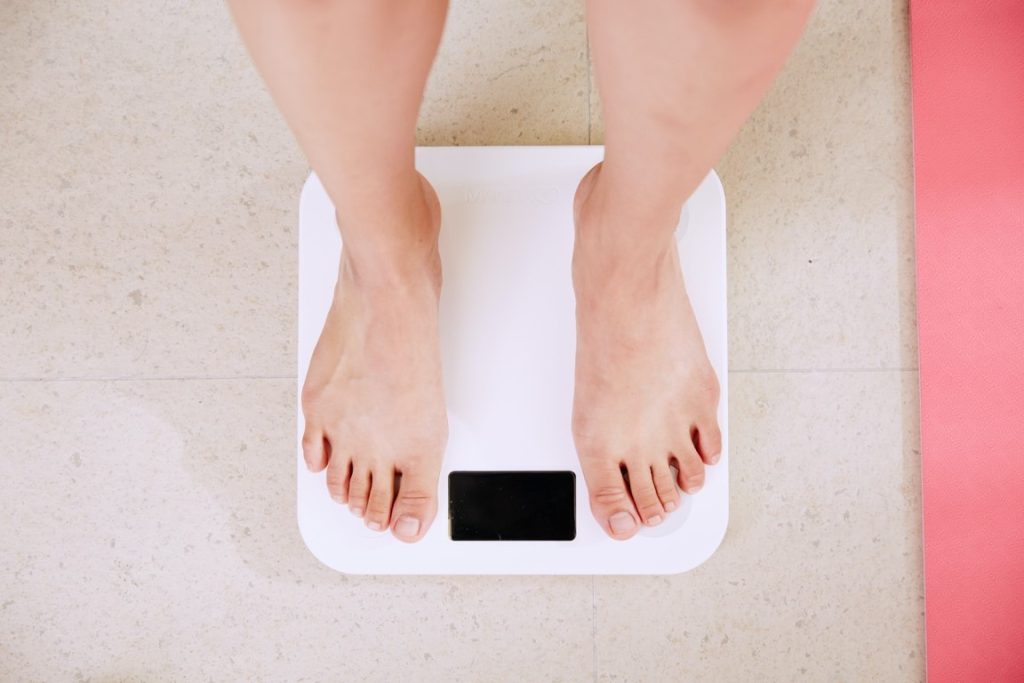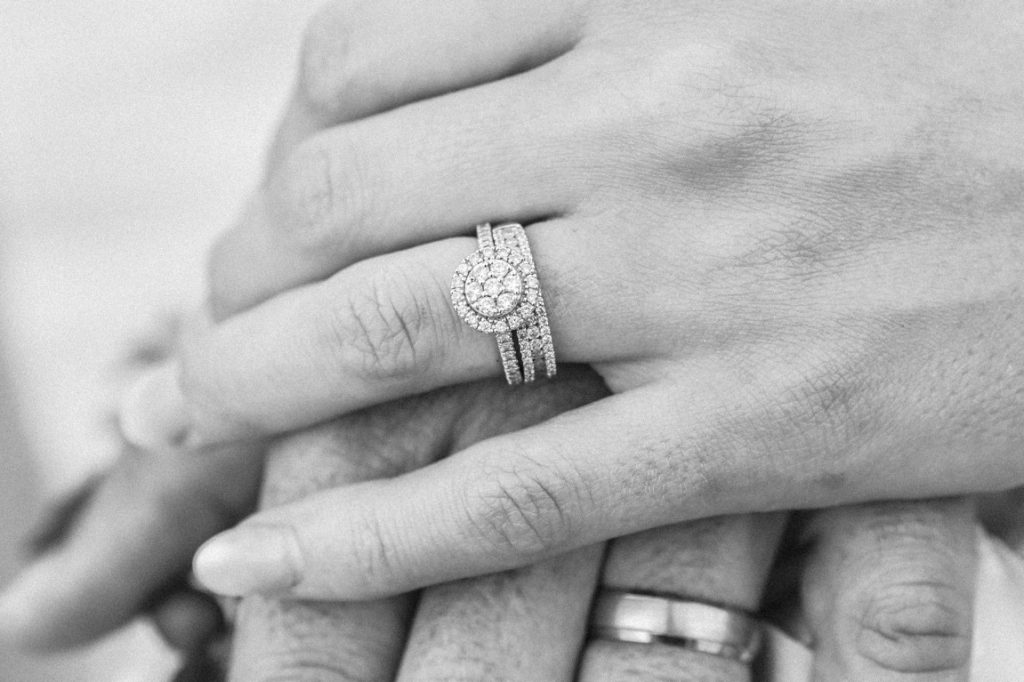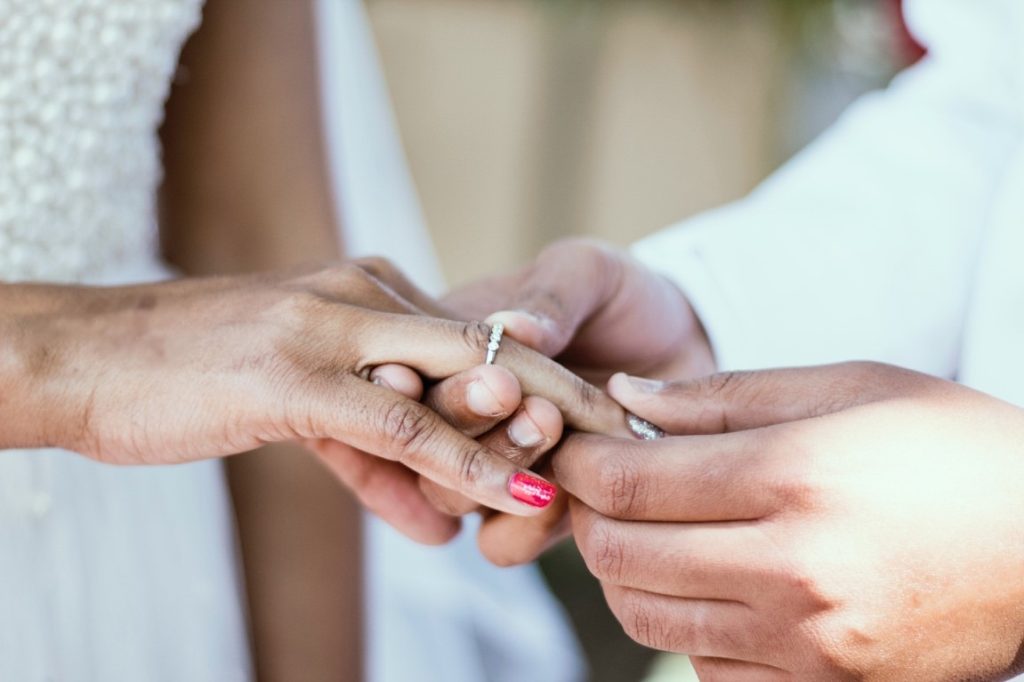Wedding rings are a symbol of lifelong love and commitment. People spend a lot of time trying to find the perfect ring to communicate their feelings for their partner. Besides its design, the size of a ring must perfectly fit your partner.
After wearing your ring for a while, you might ask yourself the question, “Why are my rings tight in the morning?” There are seven reasons why your ring may feel tighter in the morning:
- Sodium-rich diet
- Poor sleeping position
- Pregnancy
- Hot climate
- Underlying medical condition
- Weight gain
- Natural physiological processes
Each reason why rings feel tight in the morning is explained in more detail below, along with possible solutions and ways to prevent them. General tips about tight rings and swollen fingers are also given.
Why Are My Rings Tight in the Morning: Answers and Solutions

1. Your diet includes a lot of food rich in sodium.
Too much of anything can have negative results on your body. If your diet is rich in sodium, your hands may become swollen in the morning. According to Healthline, the reference daily intake for sodium is 2,300 mg, but the average American consumes about 3,400 mg per day.
Eating food that has a high sodium content can make you feel bloated the next day. This swelling occurs because sodium makes your body retain more fluids from food and drinks. Your extremities — such as your fingers — will increase in size. This might be the reason why your ring fits tight in the morning.
Keep in mind that food does not have to taste salty for it to have excess salt. Here are some common types of food with high sodium content:
- Processed meats, such as bacon, hot dogs, salt pork, and sausage
- Dried meats
- Ham
- Canned foods
- Tomato sauce
- Pickles
- Pretzels
- Processed cheeses
- Broths and stocks
- Pizza
- Shrimp
- Soup
The solution: be mindful of the food you eat. You do not have to heavily restrict your diet, as this will only result in unhealthy eating habits. Admittedly, all the food listed above is delicious. However, it is best not to eat them every day; save them for special occasions and holidays.
Instead, look for alternatives with lower sodium content. Unprocessed, whole foods will be better for your overall nutrition. If you do not have access to these foods, you can change the portions of your meals to include less sodium-rich food.
2. You have a poor sleeping position.

The position in which you sleep affects the quality of your sleep. Additionally, you might be putting a lot of pressure on certain parts of your body.
Some people sleep on their side or stomach, inadvertently resulting in an unequal distribution of weight. This sleeping position may result in swollen hands once you wake up, thus making you feel that your ring fits tight in the morning.
The solution: you can change your sleeping position or switch to a different mattress and pillow. You can place pillows underneath your lower back or knees to make yourself comfortable in a back-sleeping position.
You can also place pillows by your hips and midsection to stop you from rolling over. Furthermore, there are high-tech sleeping aids that you can look into, which will help you stick to one position.
If you want to stay in a side-sleeping position, opt for pillows and mattresses that will decrease the pressure on your hips and shoulders. Choose memory foam, medium-soft, or medium mattresses. Alternatively, you can also go for a mattress topper.
Although side-sleeping would be considered a better position than back-sleeping, there is no problem with the latter as long as you have no other medical conditions and are not pregnant.
3. You are pregnant.

Swelling around the feet, ankles, and hands is common during pregnancy. This phenomenon is medically known as “edema,” and it often happens as the pregnancy progresses.
A woman’s body creates 50% more bodily fluids and blood to support her baby’s needs. The softening and swelling of the body occur as preparation for childbirth.
The solution: there are several ways to relieve yourself of the discomfort from swelling during pregnancy. Aside from getting plenty of rest, do not spend too much time in hot temperatures. Avoid wearing tight clothes or accessories around your wrist.
Do some stretching and exercises regularly. Eat more food containing potassium — such as bananas, spinach, and avocados — and lessen your caffeine intake.
To reiterate, swelling during pregnancy is common and expected. However, keep an eye out for these other symptoms:
- The swelling has become extreme.
- Your face or the area around your eyes has also become swollen.
- You also experience difficulties in breathing and chest pains.
- You have persistent headaches, nausea, and vision changes.
- The swollen area is painful or tender.
- You also experience pain in your shoulder, stomach, or lower back.
- You have suddenly gained a lot of weight.
If you observe these symptoms happening to you, call your doctor immediately. There might be an underlying condition that needs to be treated. However, even without the symptoms, you can still call your care provider for tips and assurances.
4. The climate in your area is currently hot.

Many people observe that their rings are tighter during summer. Oppositely, during winter, their rings are overly loose.
The temperature of your environment can also induce swelling; this phenomenon is called heat edema. The heat can make your blood vessels dilate, especially the longer you sit or stand. Because of gravity, more body fluids will flow to your hands and legs.
If you are visiting from a colder climate, you have an increased risk of heat edema. Furthermore, age and other medical conditions can also exacerbate the risk.
The solution: there are several ways to prevent or mitigate heat edema. Firstly, avoid wearing tight-fitting sleeves and jewelry, as this can hinder fluid circulation.
To minimize the swelling, you can place your hands and wrists under cool running water. Alternatively, you can submerge your hands in cool water.
5. You have an underlying medical condition.

In some cases, your swollen fingers in the morning might be an effect of a health condition. You may already have a diagnosis, and edema is simply a side effect of the disease itself or your medication. Oppositely, you may not be aware that you have a medical condition at all.
Here are some diseases that can cause edema:
- Cancers. Certain types of cancer can cause edema, including liver, ovarian, and kidney cancers. Moreover, cisplatin and docetaxel chemotherapy can also cause edema.
Some medications included in your cancer treatment plan can also cause edema, such as steroid medications, non-steroidal anti-inflammatory drugs, hormone replacement therapy, and blood pressure medications. - Issues with your kidney. As mentioned above, swelling is the result of your body retaining more water. Your kidneys’ main function is to cleanse our bodies of toxins and excess fluid. Edema may be a symptom that your kidneys are not functioning optimally.
- Scleroderma. Scleroderma is an autoimmune disease that targets your skin, internal organs, and connective tissue. Swelling in the hands and fingers during the morning is a common symptom of this disease.
- Arthritis. Arthritis refers to a disorder that affects one or more of your joints. Swollen joints, hands, and fingers in the morning are common manifestations of arthritis.
There are several types of arthritis, including rheumatoid arthritis, osteoarthritis, and cervical spondylosis. - Carpal tunnel syndrome. This condition arises when a part of the wrist is compressed, squeezed, or overused. Carpal tunnel typically results in numbness, pain, and tingling on your forearm and hand.
Not wearing your splint while you sleep can result in swollen hands the next morning. - Allergic reaction. Some types of allergic reactions can cause fluid retention. Though more common around the head area, swelling from allergies can also occur in the fingers.
- Vascular disorders. Vascular diseases attack your circulatory system, which will affect your blood circulation. Peripheral vascular disease, in particular, can cause swelling and cramping in your hands.
Preexisting conditions, such as diabetes and high blood pressure, and lifestyle choices can increase your risk for vascular disorders. - Broken finger. If you injure your finger, it will become swollen. If left untreated, the finger can become deformed.
This list is not meant to be exhaustive, nor should it be used to self-diagnose. Doing so will only cause unnecessary panic.
The solution: consult a doctor. They can check your symptoms, conduct the appropriate tests, and diagnose you accurately. If necessary, they will come up with a personalized treatment plan to help you overcome your disease.
6. You have gained some weight.

As we age, we gain weight more easily. Other factors, such as stress, can also make us put on extra pounds. Weight gain can cause swelling in the fingers and a general increase in ring diameter.
If you find yourself asking, “Why do my rings feel tight in the morning?” you may have simply gained some weight. This is perfectly normal; there is no need to be ashamed.
The solution: you can try to lose weight, get your ring resized, or change your ring. With a proper diet and regular exercise, you can get to your desired weight.
There are modifications a jeweler can add to your ring to make it more adaptable. However, there is a limit to how much a ring can be resized — past that, buying a new ring is the better option.
7. Your fingers are swelling, but there is no reason behind it.

Sometimes, our fingers will become bloated for no real reason. Moreover, the swelling of our fingers is a byproduct of our body trying to maintain a stable temperature. Even though we have come a long way in terms of our understanding of physiology, there is still a lot to uncover.
The solution: you can simply remove your ring and wait for your fingers to contract.
General Tips to Keep in Mind

How Tight Is Too Tight?
Rings are supposed to be tight, but we might not be able to tell if it is already too tight. Here are some indicators that your ring is too tight:
- You cannot remove your ring despite a lot of effort.
- Your ring finger feels colder compared to other fingers.
- There is a “muffin top” on your finger, wherein some skin bulges around the ring.
- You cannot spin the ring around your finger.
- You feel pain in your finger.
- There is a tingling sensation around the ring.
- There is some discoloration on the skin around your ring.
Ring Modifications
There are several ways a jeweler can resize your rings, such as stretching the band and adding more metal to it. However, several alternatives will achieve the same results. In some cases, these alternatives will also make your ring more flexible for future body fluctuations.
- Adjustable shanks
- Ring guards
- Ring size adjuster
- Split vinyl tube
Taking off a Ring That Will Not Budge

When you want to take off your ring, but it would not slide off your finger because it is swollen, here are some methods you can try:
- Instead of twisting the ring, rock it over your knuckle.
- Use lubricant to make it easier for the ring to slip off. You can use soap, lotion, Windex, butter, oil, or whatever is available to you.
- Try the RICE method to lessen the swelling.
- Use some thread or dental floss under the ring and around the finger.
- In the worst-case scenario, you may need to visit a jeweler so they can cut the ring.
Do Some Stretching Every Morning
Starting your day with stretching has multiple benefits. For one, it helps you mentally and physically prepare for the day ahead. It can also alleviate any pain or tension from your sleeping position.
Moreover, stretching will increase your blood flow, thus helping with swollen hands. Here are some stretches you should incorporate into your routine:
- Stretch your arms in front of your body, then unhurriedly draw circles in the air with your wrists.
- Gently make a fist with your fingers and then release them. Repeat this set of motions at least five times.
- Raise your arms above your head as if reaching for the ceiling and let them stay there for a few moments.
Home Remedies for Swollen Fingers

Along with stretching, there are other home remedies you can use to minimize the swelling of your hands. Small changes to your daily habits can also lessen the swelling. Here are some remedies that may give you some relief:
- Avoid staying still for extended periods
- Exercise regularly
- Apply heat to your muscles, as this will help them relax and circulate more blood
- Put your hands on the arms of the chair or the table when you are sitting
- Place an ice pack in a towel and press it on your swollen hands
- Take a shower with warm water
- Press a hot pack on your swollen hands
- Drink a lot of water
Consult a Doctor
As mentioned above, there are situations where swollen fingers are a symptom of an underlying medical condition. Whether you are pregnant or not, it is a good idea to consult a doctor. If no diagnosis comes out of the consultation, then you can sleep peacefully.
If the doctor finds something, then you can start getting treatment immediately. If you are looking for a sign before booking a doctor’s appointment, here are some indicators that it is time to visit a doctor regarding your swollen hands:
- You have a medical history of kidney disease or issues with your lymph nodes.
- Your hand becomes swollen regularly.
- Home remedies do not cure or manage your swollen hands.
- There is pain and tenderness in the swollen hands.
- When your hands or fingers swell, it is accompanied by redness, a high fever, and other signs of a severe infection.
- You have a history of substance abuse, especially intravenous drugs.
Ultimately, swelling of the hands and fingers is usually not indicative of any long-term health issue. However, it is better to be safe than sorry.